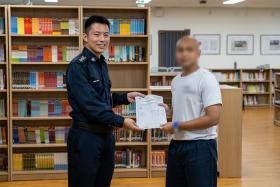Learning to help the young and old
Gerontology, early childhood education students at SUSS get hands-on training
For some degrees, especially those related to intergenerational interactions, vocational experience can be more important than theoretical learning.
The SR Nathan School of Human Development at the Singapore University of Social Sciences (SUSS) recognises this, offering its students in gerontology and early childhood education ample opportunities to put theory into practice.
Professor Kalyani K. Mehta, head of the gerontology graduate programme at SUSS, said: "It is a balanced programme containing practical and academic training.
"The internship course and group projects offer opportunities for hands-on learning which leave a strong imprint in the students' minds."
Last year's annual Population In Brief report, released by the national Population and Talent Division, showed that Singapore was greying at a faster pace compared with the last decade, making a course in gerontology - the scientific study of old age and the problems of old people - all the more relevant.
Introduced in United States universities in the 1950s, the discipline took some time to enter the Asian university curriculum, with Japan blazing the trail.
Professor Kalyani, who is also a council member of the Singapore Gerontology Society, added: "Gerontology is fascinating because it sheds a multidisciplinary perspective on the issues, policies and services related to ageing.
"Evidence-based research is required for sound policies. When we look for solutions we should contextualise within the culture(s) of our seniors, their life experiences and language preferences."
Alumni of the course frequently pursue careers as centre managers in research and in clinical practices like counselling.
A group of alumni is also involved in giving feedback to the Changi Airport management on the elder-friendliness of the facilities.
For Associate Professor Dora Chen, the head of early childhood education at SUSS, it was actually hands-on experience with children that sparked her interest in the subject.
She said: "I stumbled into this field. When I was studying in the US, I looked around and wondered why it was so easy for my American classmates to interact with young children when it was so hard for me to even find words to say to them."
She is a firm believer in playing as a way for children to learn, saying that play is how children learn about things, people and relationships.
She said of her experiences in different countries from China to the US: "I have come to appreciate how teachers and parents all have a common goal of providing the best for children even if our methods might vary.
"We are all still continuing to figure out how best to provide quality care and education for our children."
She believes that it is a common misconception that working with children does not take skill.
She said: "I think that pursuing degrees is a natural and important endeavour for those seeking to broaden and deepen their existing knowledge and skills. It is also about professionalising the profession."
Get The New Paper on your phone with the free TNP app. Download from the Apple App Store or Google Play Store now




